As someone who has been in the arena of Leadership and Coaching for all of my professional life, it seems strange to see so, so many people referring to themselves as a coach but without any form of coach education. You wouldn’t claim to be a heart surgeon without any training, qualifications and experience, so why claim to be a coach without any skills knowledge and experience of coaching? But even within coaching and coach education there are so many different models and conceptual ideas about how coaching should be done and delivered. There are so many courses that claim to offer a qualification ranging from something online, to qualified life coach in a day to those that take years of study with supervised practice as part of the coach education journey. So as a coaching client, or aspirant coach or even a qualified coach looking to know how your qualifications relate to other coaches, this can be a minefield to decipher. I am going to share with you a relatively straight forward overarching model (a meta model) which may give you an insight into where your coach education sits.
Is Coaching a Dirty Word?
So, coaching appears to be steadily becoming a dirty word, or is it? It seems as though everyone that once did something, is now trying to share with you how to do what they think they did. This has created some ambiguity about what Coaching actually is.
The Association for Coaching define coaching as. “A collaborative solution-focused, results-orientated and systematic process in which the coach facilitates the enhancement of work performance, life experience, self-directed learning and personal growth of the coachee.”
International Coaching Federation defines coaching as “Partnering with clients in a thought-provoking and creative process that inspires them to maximize their personal and professional potential.”
These definitions of coaching impliy that there will be an outcome and the process is centred around the coachee. This means that we coach people and not things and enter into meaningful non-directive relationships with a coachee. If done well it will be a dynamic and magical experience that will add value to your life. In the meantime, remember it is you that runs your business and it is you that lives your life, so when you consider look for a coach you may want to ask them about their approach or their coaching philosophy and will you and your needs and your future outcomes, be at the heart of what you will experience.
The Art and Science of Coaching
Coaching can be both an art and a science which means that a coach needs to be both qualified and experienced to best serve your needs. Competent and professionally accredited is a great starting point to finding a great coach. Whilst not all great coach’s will be a member of a coaching professional body, coaching professional bodies require a demonstration of coaching competence and a commitment to a coachee centred code of ethics which all members will have demonstrated a commitment to meet your needs. The main professional bodies to look out for are the International Coaching Federation (ICF), the European Mentoring and Coaching Council and the Association for Coaching.
Looking at Coaching through a different lens
Having spent nearly 30 years exploring this arena I am going to propose a very simple model which may allow the exploration of the world of coaching in a way that is relatively simple and easy to explain where your coaching sits within the world of coaching. The model that I am going to propose isn’t an exhaustive one but it is a way of exploring the coaching paradigm. With a few simple building blocks, it will allow you to explore which coaching paradigm a coaching framework sits in.
In order to do this, we need to explore an overarching framework, the meta position, on coaching and identify some simple components that are consistent across most coaching models. The list of these components are not exhaustive and is quiet straight forward, they are as follows:
Coaching Components
- The Coaching Environment
- The Coach
- The Coachee
- The coaching process
None of these need to be explain in specific detail at this stage, but explanations will become apparent as we explore what I am proposing. They are simply a place setting for an idea, it is how these ideas come together that will be the difference that makes the difference in the way we explore coaching.
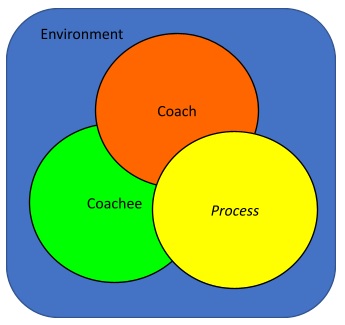
These coaching components can be represented in the following way, by adapting the way a number of traditional leadership models are represented it becomes an easy way of sharing the relationships within these ideas. I shall use this framework as the basic building block to explore how we can understand what coaching model fits in where.
I am also going to suggest a coaching continuum which will prioritize different elements of these basic building blocks at different phases along the continuum.
The Coaching Continuum
The Coaching Continuum or Coaching Spectrum isn’t exhaustive but is a simple way of exploring a number of coaching paradigms using a meta framework. This is illustrated below.

This is a continuum but I have used the words to identify and explore some specific locations within it.
The Expert Coach
For the expert coach they are the all-important piece of the coaching equation. It is what they know as a result of their experience and expertise that they are sharing. In some models then this may be seen as a mentoring relationship where knowledge and experience is shared and is all important. In a healthy way this is seen in sports coaching where coaches share knowledge and advice and guidance about how to achieve peak performance.
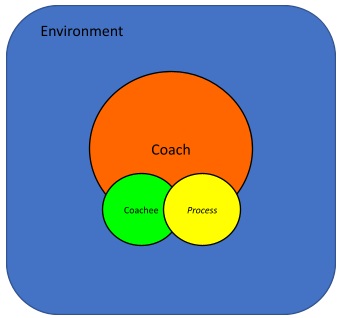
The relationships between coach and coachee are often strong and it isn’t that the coaching process is ignored, but it is often created by the knowledge and understanding of the coach. This is a coach centric model, relying on what the coach knows and how they choose to apply or share it. The style of coaching and the coaching environment is created by the coach and so if the coach was to leave, all elements of the coaching would go with them. This may leave the coachee or coachee’s floundering until a new coach is in place. This is often a vital clue that the coaching being offered is at this end of the spectrum. This style of coaching, whilst it can produce some great results, often leaves the coachee dependent on the coach for their performance improvement and feedback. For coachee’s it’s a great place and style of coaching when you simply need to place yourself in someone else’s hands. Understanding when to move on as you grow and develop is key to not being trapped or becoming dependent on this style of coaching. This style of coaching can sometimes be confused with some forms of consultancy and it hinges around what the coach has to say. If kept in this place it often doesn’t create the coachee as an independent performer.
When this is done in a very unhealthy way than this can be the realm of the Coaching Contrepreneur, follow my formula for success, this is how you coach and get clients often with the lure of a massive payout and a significant salary. The message here is very often follow what I did, and creates dependency in coaching.
The Engineered Coach
For the Engineered Coach the all-important part of the equation is the coaching process, for nearly every coaching model there is some form of process and it is the importance of the adherence to it that places a coach or coaching framework in this part of the spectrum. There are many coaching models, frameworks and coaches to choose from. For many coaches this is the place that they start. If we were to use a standard skill acquisition competency framework then attending a course and learning the art and science of coaching is where potential coaches establish conscious incompetence before transitioning into conscious competence as a coach. It is the place where a coach learns the science and the mechanics of coaching, if the quality of training is good it will help mitigate against any risk for both the coach and of the coach’s future coachee’s and they have a safe process to follow.
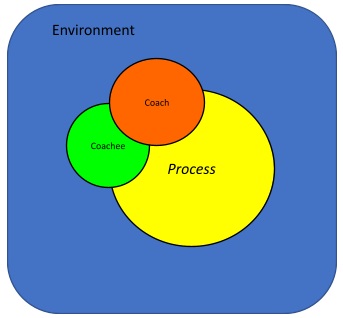
The Challenge that will always exist with this place is that process is always historically designed. It will have grown and evolved from many previous coaching experiences but not necessarily out of the live conversation that is happening between coach and coachee right now. Often when coaching becomes process centric the process becomes incredibly complicated to accommodate all of the needs of all potential coachee’s. When done in a healthy way this is the place that most coach’s start from, as they learn process, models, tools and protocols to establish the science of good coaching practice. With the addition of great coaching supervision this can be a fabulous platform to move on into the emergent coaching environment. The engineered coaching space also means that there is a process that can be replicated, taught and a framework that feedback can be provided against, which can allow coaches to grow and develop.
When this is done in an unhealthy way it becomes a place where process is king and not the client. There can be an inflexibility to evolve and adapt the process to accommodate the specific clients’ needs, creating over dependence on the process by the coach. Often the coach only feels confident when within the coaching framework or model they understand and know.
The Emergent Coach
For the emergent coach the all-important part of the equation is the coachee. In addition to this the relationship between the coach and coachee and the coaching environment or coaching space that is created is a very close second. When done well this is a physical, emotional and even at time spiritual one. There is a certain irony in placing the emergent coach within this model. It is not that process is simply now tossed to the wind, but it is not overt and will evolve and grow, expand and contract as the coaching relationship or session needs it. This end of the spectrum requires the coach to be dynamic and well versed in his or her relationship with themselves to properly understand what it is that they are bringing to and possibly influencing unconsciously in the coaching environment.
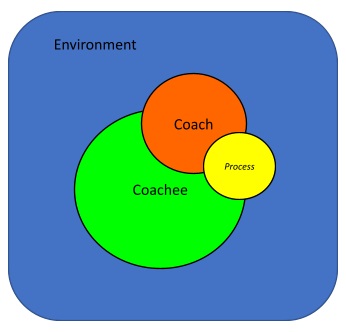
When I reflect on my interpretations of both the International Coaching Federation and Association for Coaching definitions of coaching it is this end of the spectrum that I think about. It is a dynamic and even magical environment where it is tacit knowledge and understanding of coaching that is the difference that makes the difference and the explicit components of a coaching conversation are so elegantly woven in it appears seamless.
When done in an unhealthy way then from the outside looking in on such a conversation a bystander may be confused with the expert coach. But both coach and client will be well served and protected by a lived code of ethics by the coach on behalf of the client.
In The Real World
In the real world there is probably a dance between engineered and emergent for all qualified and accredited coaches. Constantly striving to be in the emergent space but occasionally needing to dip into the engineered space to use a coaching tool or framework to provide the structure need to support the coachee and their expectations.
How Does NLP Fit Into This?
I believe that you could probably re-read all of this and replace coaching with NLP. Perhaps not literally in the real world but as a vehicle to explore the continuum I have suggested. Whilst both as a qualified coach, trainer of NLP and practicing NLP Master Practitioner I find myself focusing on being as much as possible at the emergent end of the spectrum. I have the echoes of John Overdorf ringing in my ears when he quotes something Richard Bandler used to say “NLP is just an elegant conversation”. John always added if you get the pre-frame right you will probably never do an intervention. I have always understood this to be the emergent environment. If you create the right environment with the language that you use the client or coachee will feel empowered to make the changes for themselves.
The NLP Continuum

You often see NLP being taught from one of the positions along the continuum, there are those that are the experts and want you to copy them. There are those that teach NLP from a place where it is all about the process and interventions are the key. Then there are those that live the beautiful presuppositions of NLP and one may say that they are NLP and create a fabulous space for the client to explore their choices and gather together their resource’s to be empowered to live the life they choose to live.
There are some simple tells that an NLPer is in the engineered space, they ask questions like what intervention do you use for procrastination or what do you use for clients with anger? The focus of these question is the acquisition of an answer, where an NLPer in the emergent space would answer these questions with it depends? There are so so many questions you would want answers to, about the client and their model of the world before you could offer an answer to such a question.
Moving Forward
Whilst not all NLPers are coaches and not all coaches know NLP we do share some things in common, which is to support people, teams and organisations being different in the world. Is it time that we as NLPers looked at some lessons for the coaching world and explore how they may fit into our world? Is it time that we acknowledge, that like coaching courses, not all practitioner trainings are equal but they can all have a healthy role to play in shaping the future of NLP and that those who are accredited with the Association of NLP are definitely in the right-hand side of the continuum?
Another Way Of Looking At This
May be another way to look at this is not strictly as a continuum but is to take the perspective of how we may appear to a coachee?
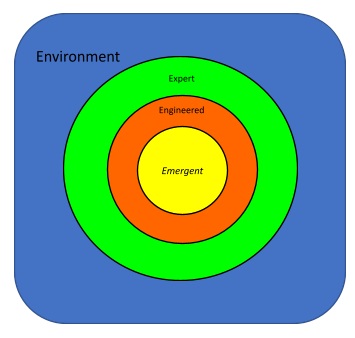
Maybe at the heart of all good NLPers should be the ability to be in an emergent coachee centered place.
